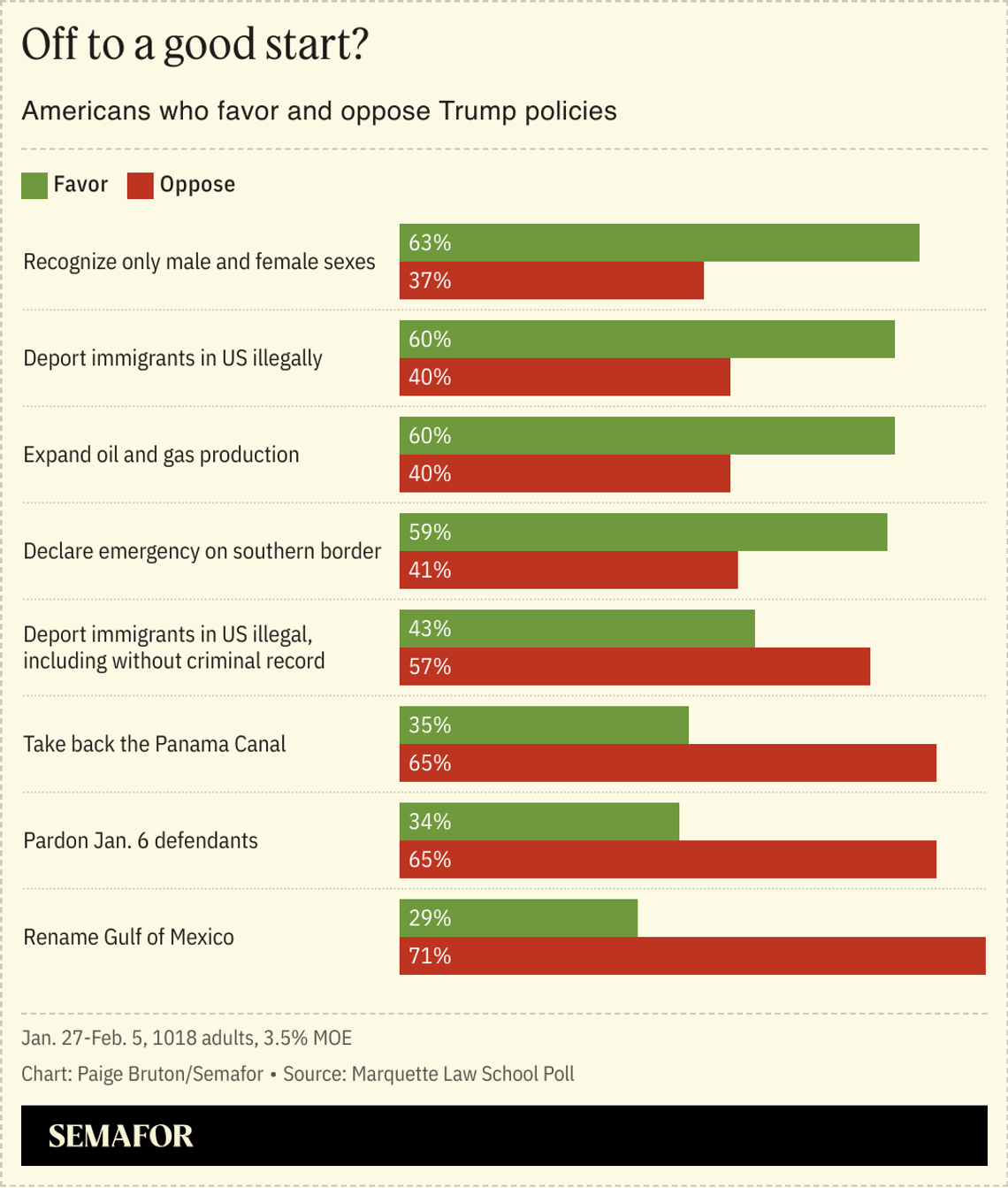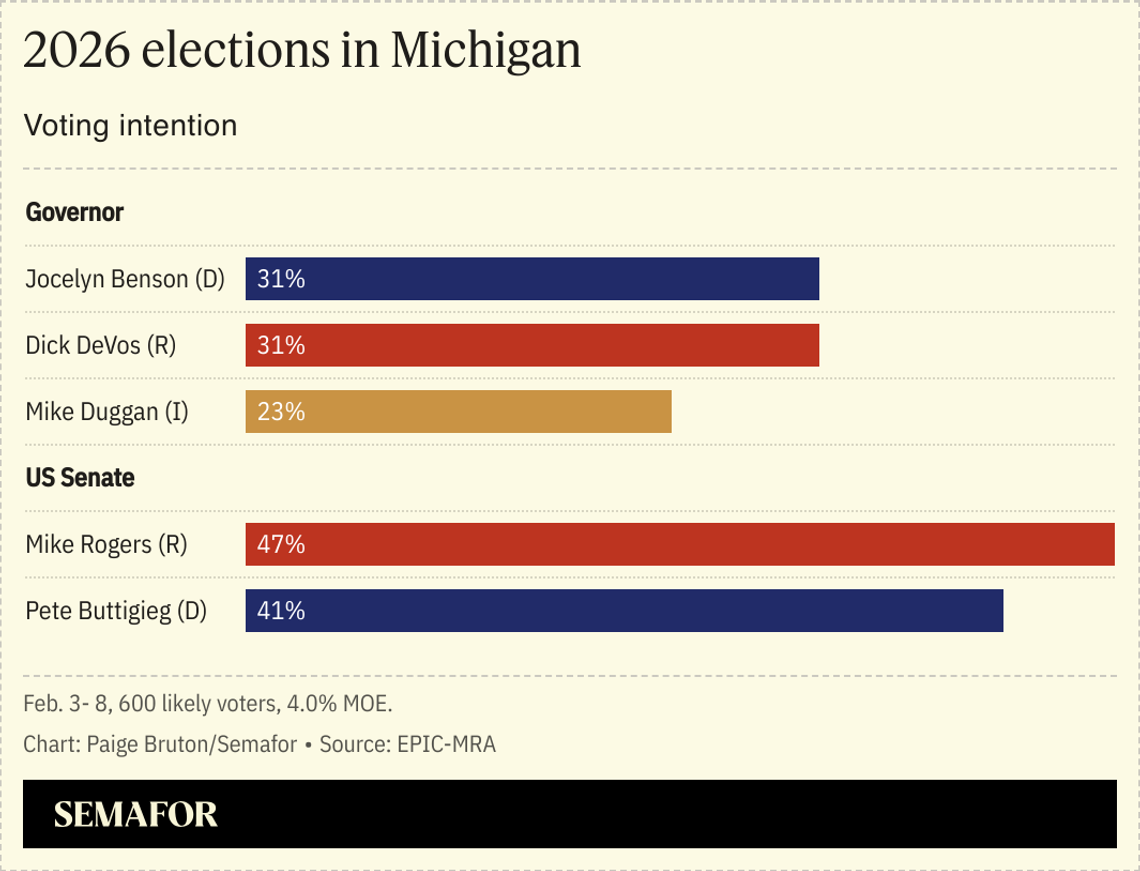 Polls There are a few reasons why Donald Trump is more popular at the start of his second term than at his first. One of them, basic but underappreciated: He’s made some popular moves, very quickly. There was widespread support for his gender-related executive orders — barring transgender people from military service, not polled here, was the only one without majority approval. His first immigration moves, all of them sued over by Democrats, were popular and previewed at length in 2024. But only Republican voters, who approve of every Trump decision so far, are satisfied by the Jan. 6 pardons and the renaming of the Gulf of Mexico, a surprise that Trump didn’t campaign on. Just 16% of independents support this, even as the administration bars the Associated Press from the White House pool for not adopting it. When immigration is a high-salience issue, Trump benefits; when a fringe idea gets more salience, he suffers.  Democrats have made it easier for Republicans to compete in next year’s Michigan elections with a few crucial decisions. First, Detroit Mayor Mike Duggan, a Democrat in a city that never elects Republicans, opted to bypass the Democratic primary and run for governor as an independent. He draws both Democratic and Republican voters, but he’s unsurprisingly strongest in Detroit and its suburbs, where Democrats need landslides to win statewide. Second, Sen. Gary Peters declined to seek a third term, with no clear successor, but one very famous one: Pete Buttigieg, who only moved to Michigan recently. He’s the only Democrat tested here (as several more look at the race), and he’s in a fairly weak position, losing independents to Rogers. As last year’s GOP nominee for Senate, Rogers lost independents by 7 points. Ads @Karrin for Arizona/YouTube @Karrin for Arizona/YouTube- Underly for Wisconsin, “Future.” Four years ago, Republicans tried to turn the race for Wisconsin’s nonpartisan superintendent of public instruction office into a referendum on gender identity in schools and sports. It helped them narrow the gap a bit in a contest that Democrats tended to win easily, with the support of teachers’ unions. But Democratic Party-backed Jill Underly won anyway, calling the cultural issues distractions, and her reelection campaign messaging is all about classroom deliverables — graduation rates, funding, standards. There’s a subtle cultural message there, too: Underly isn’t talking about the debates over equity in testing that have been politically devastating to liberals in other states.
- Karrin for Arizona, “Karrin Taylor Robson for Governor.” True four years ago, true now: The most important thing any Republican candidate can show primary voters is a Trump endorsement. Robson spent more than $10 million of her own money on her 2022 bid for governor of Arizona, and lost because of Trump’s support for Kari Lake. Last year, Trump used his speech at Turning Point Action’s AmericaFest to endorse Robson. Her intro spot is entirely about the Trump endorsement, contrasting it with the “open borders career politician” in the governor’s office — Katie Hobbs, pitched with Joe Biden and Kamala Harris, who have been silent about national politics since Jan. 20.
ScoopedMy favorite stories start with one of two questions: “Why is this happening?” and “Why isn’t this happening?” And the latter category is underrated. When no one wants to talk about something, it can be hard to put it on paper — but that’s why they don’t want to talk. Daniel Payne’s Politico reporting on pharma’s quiet stand-down over the Kennedy HHS nomination notes that “none” of the groups with business before the department wanted to comment on why they did nothing to oppose him. “One public affairs executive said health groups are now seeking to tailor their messaging with populist movements — such as Kennedy’s MAHA following — in mind.” While other people were counting votes (which added up to 52, as usual), Payne identified a lobbying strategy that will shape the next four years. Next - 46 days until Wisconsin’s state supreme court election
- 263 days until off-year elections
- 626 days until the 2026 midterm elections
David RecommendsIt’s never too early for the “invisible primary,” to watch what potential presidential candidates are doing or to speculate about their chances. Illinois Gov. JB Pritzker has picked high-profile, buzzy fights with the president. Pennsylvania Gov. Josh Shapiro keeps avoiding the DC discourse (apart from condemning the pardons of Jan. 6 rioters). Connecticut Sen. Chris Murphy is appearing on your TV at this very second. I don’t agree with Ettingermentum’s full ranking of the 2028 hopefuls, but it’s a good first stab at this, before anyone knows what the primary calendar will be. |